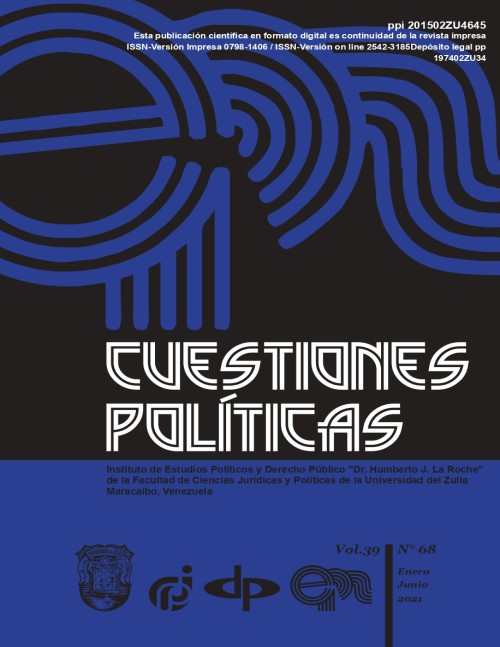The Subsidiarity Principle and Legal and Economic Aspects of The Decentralization in Ukraine
Abstract
The research highlights the peculiarities of the decentralization of power in Ukraine in the political and legal implementation aspect of the principle of subsidiarity. The objective of the study was to determine compliance with the political and legal aspects of the decentralization process in Ukraine based on global standards of the use of the principle of subsidiarity, during the implementation of decentralization reform. The research methodology is because the principle of subsidiarity is the main feature of the interaction of all levels of power. This premise is recognized in the European Charter of Local Self-Government and therefore means an urgent task in modern Ukraine. Financial decentralization, district consolidation, the creation of different but united territorial communities, changes in the administrative-territorial structure, ensuring the capacities of communities, the provision of public services in accordance with national standards must be based on the principle of subsidiarity. The information gathered makes it possible to conclude that the principle of subsidiarity is a barrier to the overly profound centralization of the state body and the separation of power.
Downloads
References
BANTASH, Anastasiia; KOVAL, Viktor; BASHYNSKA, Maryna; KOZLOVTSEVA, Valentyna. 2020. “Balanced territorial economic development in the conditions of providing stability of human resources management” In: Economics. Ecology. Socium. Vol. 4, No. 3, pp. 58-66.
BATANOV, Oleksandr Vasylovych; KRAVCHENKO, Viktor Vitaliiovych; PRYKHODJKO, Khrystyna Viktorivna. 2014. “Participatory democracy in local government system: problems of legal regulation” In: Public Administration Aspects. Vol. 2, No. 9-10, pp. 12-28.
BROWN, Lionel Neville; BELL, John; GALABERT, Jean-Michel. 1998. French administrative law. Clarendon Press, UK. Oxford, England.
CASTAÑO GÓMEZ, Liliana. 2017. “Modelos teóricos que explican el liderazgo político” En: Cuestiones Políticas. Vol. 33, No. 58, (enero-junio) pp. 34-57.
DECENTRALIZATION IN UKRAINE. 2020. Available online. In: https://decentralization.gov.ua. Consultation date: 14/05/2020.
EUROPEAN CHARTER OF LOCAL SELF-GOVERNMENT. 1985. Available online. In: https://rm.coe.int/168007a088. Consultation date: 14/05/2020.
HRUBAS, Viktoriya Viktorivna. 2015. The principle of subsidiarity in decentralization process. Grani, Vol. 19, No. 1, pp. 17-23. Available online. In: https://doi.org/10.15421/1716003. Consultation date: 14/05/2020.
KOVAL, Viktor; MYKHNO, Inessal ANTONOVA, Liudmyla; PLEKHANOV, Dmytro; BONDAR, Victoria. 2019. “Analysis of environmental factors’ effect on the development of tourism” In: Journal of Geology, Geography and Geoecology. Vol. 28, No. 3, pp. 445-456.
KOVAL, Viktor; SLOBODIANIUK, Olga; YANKOVYI, Volodimer. 2018. “Production forecasting and evaluation of investments using Allen two-factor production function” In: Baltic Journal of Economic Studies. Vol. 4, No.1, pp. 219-226.
KVITKA, Sergiy. 2015. “The principle of subsidiarity and decentralization in Ukraine” In: Public Administration Aspects. Vol. 3, No. 4, pp. 28-35.
KVITKA, Sergiy; BORODIN, Yevgeniy; YEMELYANOV, Volodymer; IVASHOVA, Lіudmyla; BOCHAROV, Oleksii. 2020. “The foresight of national economy's digital development” In: Revista inclusiones. Vol. 7, special number, pp. 112-125.
MLED. 2020. Ukraine municipal local economic development program. Available online. In: http://www.mled.org.ua/ukr/materials/publications. Consultation date: 14/05/2020.
NAZAROVA, Karina; HORDOPOLOV, Volodimir; KOPOTIIENKO, Tetiana; MINIAILO, Viktoriia; KOVAL, Viktor; DIACHENKO, Yuliia. 2019. “Audit in the state economic security system. Management Theory and Studies for Rural Business and Infrastructure Development”. Vol. 41, No. 3, pp. 419-430.
NOYHAUZ, Norbert. 2005. Tsennosti hristianskoy demokratii (Values of Christian Democracy). – M. Respublika, RU. Moscow, Russia. (In Russian).
OECD. 2020. Regional Statistics. Available online. In: www.oecd.org. Consultation date: 14/05/2020.
PROKHOROVA, Viktoriya V; ARTEMOVA, Elena I; MIROSHNICHENKO, Marina B; AVANESOVA, Rita Rafaelovna; CHAZHAEVA, Maynat Mausurovna. 2020. “Cluster Technology as a basis for the competitive development of industries in Russia” In: Revista de la Universidad del Zulia. Vol. 11, No. 29. Disponible en línea. En: https://doi.org/10.46925//rdluz.29.17. Consultation date: 14/05/2020.
POPE PIE. 1931. Encyclique Quadragesimo anno. L'École sociale populaire. Montréal, Canada.
POPE LEO XIII. 1891. Rundschreiben unseres Heiligsten Vaters Leo XIII. (...) über die Arbeiterfrage: (15. Mai 1891: Rerum novarum") = Sanctissimi Domini nostri Leonis divina providentia papae XIII. Litterae encyclicae de conditione opificum. Freiburg i.B: Herdersche Verlagshandlung. Roma, Vatican (in Latin).
POPOVA, Olga L; KOVAL, Viktor V; MIKHNO, Inesa S; TARASOV, Igor V; ASAULENKO, Natalya V; FILIPISHYNA, Liliya M. 2020. “Assessments of national tourism development in terms of sustainability and inclusiveness” In: Journal of Geology, Geography and Geoecology. Vol. 29, No. 2, pp. 377-386.
REGIONAL POLICY OF THE EUROPEAN UNION. 2018. History and Modernity European Integration: step by step. Fund «Yevropa ХХІ». Available online. In: http://old.europexxi.kiev. ua/ukrainian/program/zmi/book3/036.html. Consultation date: 14/05/2020 (in Ukrainian).
YANKOVYI, Oleksandr; KOVAL, Viktor; TROKHYMETS, Olena; KARPENKO, Maryna; MATSKEVICH, Yuliia. 2020. “Economic assessment of investment on the basis of production functions” In: Turismo: Estudos & Práticas. Available online. In: http://natal.uern.br/periodicos/index.php/RTEP/article/view/1310. Consultation date: 12/03/2020.
Copyright
The authors who publish in this journal agree to the following terms:
The authors retain the copyright and guarantee the journal the right to be the first publication where the article is presented, which is published under a Creative Commons Attribution License, which allows others to share the work prior to the recognition of the authorship of the article work and initial publication in this journal.
Authors may separately establish additional agreements for the non-exclusive distribution of the version of the work published in the journal (for example, placing it in an institutional repository or publishing it in a book), with an acknowledgment of its initial publication in this journal.
This work is under license:
Creative Commons Reconocimiento-NoComercial-CompartirIgual 4.0 Internacional (CC BY-NC-SA 4.0)






































